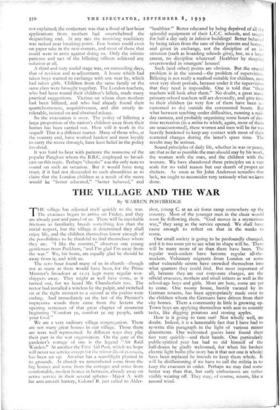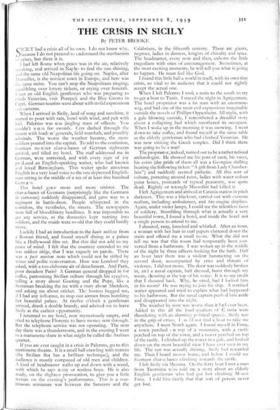THE VILLAGE AND THE WAR
By WARREN POSTBRIDGE THE village has adjusted itself quickly to the war. The evacuees began to arrive on Friday, and they are already part and parcel of us. There will be inevitable frictions as familiarity breeds something less than the initial respect, but the village is determined they shall enjoy life, and the children themselves know enough of the possibilities to be thankful to find themselves where they are. "I like the country," observes one young gentleman from Peckham, "and I'm glad I'm away from the war." We, his hosts, are equally glad he should be away from it, and with us.
The zero hour found many of us in church—though not as many as there would have been, for the Prime Minister's broadcast at 11.15 kept many regular worshippers away. They might as well have come, as it turned out, for we heard Mr. Chamberlain too. The rector had installed a wireless by the pulpit, and switched on at the right moment to a second as the psalms were ending. And immediately on the last of the Premier's impressive words there came from the lectern the opening sentences of that great chapter of assurance beginning "Comfort ye, comfort ye my people, saith your God."
We are a very ordinary village. congregation. There are not many great houses in our village. Those there are were well represented. In different ways they play their part in the war organisation. On the gate of the gardener's cottage of one is the legend "Air Raid Warden." At another the First Aid Post, which we hope will never see service except for the minor ills of evacuees, has been set up. Another has a searchlight planted in its grounds. At church we remembered some from the big houses and some from the cottages and some from comfortable, modest homes in between, already away on active service in their several spheres—Major A. with his anti-aircraft battery, Colonel B. just called to Alder shot, young C. at an air force camp somewhere up the country. Most of the younger men in the choir would soon be following them. "God moves in a mysterious way," they sang as the service opened. We shall have cause enough to reflect on that in the weeks to come.
Our small society is going to be profoundly changed, and it is too soon yet to see what its shape will be. There will be many more of us than there have been. The regular week-enders have become regular all-theweekers. Voluntary migrants from London or some other vulnerable centre have crowded themselves into what quarters they could find. But most important of all, because they are our corporate charges, are the official evacuees, mothers and small infants as well as the school-age boys and girls. Most are here, some are yet to come. One roomy house, hastily vacated by its German tenants, has been appropriately made over to the children whom the Germans have driven from their city homes. There a community in little is growing up. Town boys are applying themselves with zest to country tasks, like digging potatoes and storing apples.
How is it going to turn out? Not wholly well, no doubt. Indeed, it is a lamentable fact that k have had to re-write this paragraph in the light of various minor discontents. Our welcomed guests have found their feet very quickly—and their hands. One particularly public-spirited peer has had to rid himself of the half-dozen he gladly welcomed, for when his broken electric light bulbs (the story has it that not one is whole) have been replaced he intends to keep them whole. It will be disillusioning if we have to call the militia in to keep the evacuees in order. Perhaps we may find some better way than that, but early enthusiasms are rather visibly wearing off. They may, of course, return, like a second wind. C ICILY had a crisis all of its own. I do not know why, abecause I do not pretend to Lnderstand the mechanism of crises, but there it is.
I had left Rome when peace was in the air, relatively .peaking, and arrived in Naple; to find the sun shining, and the same old Neapolitan life going on. Naples, after Marseilles, is the noisiest town in Europe, and here was the same noise. You can't stop the Neapolitans singing, squabbling over lottery tickets, or crying over funerals. I met an old English gentleman who was preparing to climb Vesuvius, visit Pompeii and the Blue Grotto in Capri. German tourists went about with stolid expressions nd .cameras.
When I arrived in Sicily, land of song and sunshine, it started to pour with rain, howl with wind, and pelt with hail. Palermo was one jingling mass of officers. You couldn't ir o -re for swords. Cars dashed through the streets with loads OF generals, field marshals, and possibly admirals. The worse the weather became, the more soldiers poured into the capital. To add to the confusion, fourteen mcn3ter char-a-bancs of German sightseers arriwd, and filled my hotel. The staff addressed me in German, were corrected, and with every sign of joy im diced an English-speaking waiter, who had known al d loved Birmingham. This waiter spoke atrocious English in a very loud voice to the one depressed Englishman sitting in the middle of a sea of at least five hundred Gem a This hotel giew more and more sinister. The char-a-bancs of Germans (surprisingly like the Germans in cartoons) suddenly disappeared, and gave way to a regiment in battle-dress. People whispered in the corridors, the vestibules, the streets. The newspapers were full of bloodthirsty headlines. It was impossible to get any service, as the domestics kept turning into soldiers, and the maids were so old that they could hardly move.
Luckily I had an introduction to the haute noblesse from a Roman friend, and found myself dining in a palace like a Hollywood film set. But this did not add to my peace of mind. I felt that the courtesy extended to me was noblesse oblige, that I was vaguely on parole. There was a post mortem note which could not be stifled by wines and polite conversation. How was London? they asked, with a too elaborate air of detachment. And Paris, poor decadent Paris? A German general dropped in for coffee, patronising Sicilian culture through his eyeglass, telling a story about Goering and the Pope, like a Scotsman breaking the ice with a story about Aberdeen, and asking me about cricket. Th.-: hostess begged me, ill had any influence, to stop our airmen from bombing her beautiful palace. At twelve o'clock a gentleman arrived, drank a double brandy, and adviscd me to leave Sicily at the earliest opportunity.
I returned to my hotel, now mysteriously empty, and tried to telephone Florence to have money sent through. But the telephone service was not operating. The next day there was a thunderstorm, and in the evening I went to a marionette show in what might be called the Arabian quarter.
If you are ever caught in a crisis in Palermo, go to this marionette theatre. It is a small hall crawling with vermin (the Sicilian flea has a brilliant technique), and the audience is mostly composed of old men and children. A kind of headmaster walks up and down with a wand, with which he taps nnisy or restless boys. He is also ready, on the slightest provocation, to give you a little lecture on the evening's performance. This is a continuous miniature war 13:1ween the Saracens and the Calabrians, in the fifteenth century. There are giants, negroes, ladies in distress, knights of chivalry and spies. The headmaster, every now and then, exhorts the little tragedians with cries of encouragement. Sometimes, at the most exciting moments, he will tell you what is going to happen. He must feel like God.
I found this little hall a world in itself, with its own tiny crisis, so vital to its audience that it could not rightly accept the actual one.
When I left Palermo I took a train to the south to try to get a boat to Tunis. I stayed the night in Agrigentum. The hotel proprietor was a fat man with an enormous wig, and had one of the most evil expressions imaginable outside the novels of Phillips Oppenheim. All night, with a gale blowing outside, I remembered a dreadful story about a collapsing bed which smothered its occupant. When I woke up in the morning it was snowing. I went down to take coffee, and found myself at the same table as the elderly gentleman who had climbed Vesuvius. He was now visiting the Greek temples. Did I think there was going to be a war?
The proprietor, indeed, turned out to be a rather refined archeologist. He showed me his pots of cacti, his vases, his coins (the pride of them all was a Georgian shilling bearing the following ticket: "A gift from Lady Chamberlain") and suddenly seemed pathetic. All this sort of culture, pottering around ruins, ladies with water colour paint boxes, postcards of typical peasantry, was quite dead. Rightly or wrongly Mussolini had killed it.
I left Agrigentum and arrived at Catania station in pitch darkness. This was a blackout, carriedout with extreme realism, including ambulances, and fire-engine displays. Again, under violet lamps, I could see the relentless faces of soldiery. Stumbling through what is actually a very beautiful town, I found a hotel, and inside the hotel not a single person to attend to me.
I shouted, rang, knocked and whistled. After an hour, a woman with her hair in curl papers clattered down the stairs and offered me a small room. What she did not tell me was that this room had temporarily been converted from a bathroom. I was woken up in the middle of the night by three officers looking for the bath. Half an hour later there was a violent hammering on the second door, accompanied by cries and threats of violence. I did not move. The door was suddenly broken in, anti a naval captain, half dressed, burst through my room, shouting at the top of his voice. It is to my credit that I shouted back. Why, he cried, had I locked him in his room? He was trying to join his ship. A terrified waiter appeared and tried to explain what had happened to his bathroom. But the naval captain push,.d him aside and disappeared into the night.
The weather by now was worse than it ever been. Added to this all the loud-speakers of C tania were thundering with an alarming political speech. Sicily was • in the grip of crises. I ( o ld not find a boat to take me anywhere. I went North again. 1 found myself in Enna, a town perched c n top of a mountain, with a castle perched on top of the town, and a tower perched on top of the castle. I climbed up the tower in a gale, and looked down on the most beautiful view I have ever seen in my life. The sun was actually shining. Sicily had rewarded me. Then I heard motor horns, and bdow I could see fourteen char-a-bancs climbing towards the castle.
I left Sicily via Messina. On the ferry boat I met a man from Taormina who told me a story about an elderly English gentleman who had got lost climbing Mount Etna. I told him firmly that that sort of person never get lost.























 Previous page
Previous page